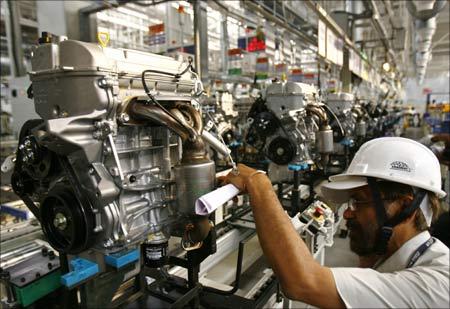 | « Back to article | Print this article |
New manufacturing policy to create 100 million jobs
In a major initiative, the government is set to approve on Thursday a new policy to boost manufacturing by reducing compliance cost for the industry and making the labour laws flexible.
As per the draft, which is likely to get a nod from a high level committee chaired by Prime Minister Manmohan Singh, the government would take steps to make industrial land available by creation of land banks.
The policy, aimed at creating 100 million new jobs by 2025, would encourage foreign investment and technologies, while reducing the compliance burden on the industry, a source said.
"This will be done through rationalisation of business regulations," the source said adding a "comprehensive exit policy has been conceptualised which will promote productivity and provide flexibility by removing rigidity in the labour market".
Click NEXT to read on . . .
New manufacturing policy to create 100 million jobs
But protection of workers' right would be ensured, he said. The new labour management norms would encourage "unwritten rules" for the unions and employers.
"The stress will be on modification in employment laws and in shop floor practices," he said.
In order to drive the "greening" of the manufacturing operations, the Government would take re-course to both regulatory as well as policy interventions.
However, what could be a dampener for the industry is the suggestion that the government should prescribe technology or design standards for emission.
Click NEXT to read on . . .
New manufacturing policy to create 100 million jobs
Aimed at enhancing share of manufacturing in the country's GDP to 25 per cent by 2025 from the about 15 per cent at present, the policy will encourage 'national investment and manufacturing zones (NIMZs)'.
These zones would promote new industrial townships and create world class urban centres absorbing surplus labour.
The Indian companies would be encouraged to access foreign know-how and develop indigenous technology through fiscal incentives and subsidies.
Preferential purchases by government agencies of indigenously developed products and technologies would be encouraged.
Click NEXT to read on . . .
New manufacturing policy to create 100 million jobs
A Manufacturing Industry Promotion Board (MIPB) would be set up at the level of Commerce and Industry Minister for coordination between different central ministries and state government agencies.
Sources said a suitable policy framework would be formulated for public sector undertakings (PSUs), especially those in the defence and energy sectors, to make them competitive while ensuring functional autonomy.
Department of Industrial Policy and Promotion, in consultation with National Manufacturing Competitiveness Council and Planning Commission has prepared the draft policy.
Other objectives of the policy are creation of appropriate skill sets among rural migrant and urban poor, increase domestic value addition and technological dept in manufacturing and enhancing global competitiveness of Indian manufacturing through appropriate policy support.
Click NEXT to read on . . .
New manufacturing policy to create 100 million jobs
In the policy, employment intensive industries, like textiles, leather, gems and jewellery and food processing would get special attention. The capital goods segment would also get special focus.
Besides, mission mode projects would be conceptualised in sectors like aerospace, shipping, IT hardware and electronics, defence equipment and solar energy to build national capabilities.
The policy would create an environment for a healthy rate of growth for the country's micro, small and medium enterprises.




